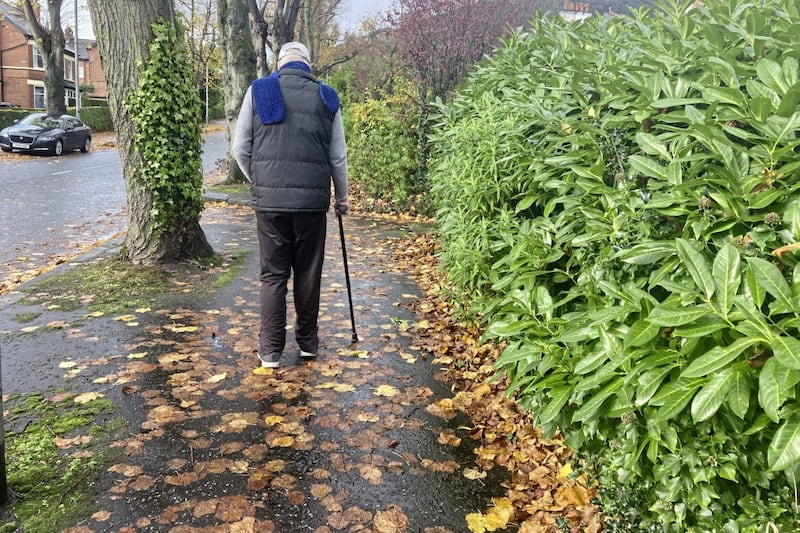AFTER a very fractured year filled with sadness for families who now have to look to the past for happy memories, for others it’s the happiest date on the calendar, different this year but nonetheless a time for children to gasp in wonderment when they see the lights, the nativity scene and colourful boxes under the Christmas tree.
However, in my experience, presents don’t hold the attention overly long and the young ones get bored, become fractious and hard to handle.
Thanks to a retired primary school teacher in Co Down, I have some answers that will help over the holiday from school.
In her note to me, Sandra said she read my article about Ollie and his Superpowers, a puppet that is introduced to children with issues by trained coaches. She wanted to point out that such puppets have been living in classrooms for years befriending children. Her life-sized puppet was called Molly – no booking required, no money to pay, just a constant friend in class.
She suggests parents could employ the same technique by getting a big doll who will become a member of the family and will be involved in sensitive discussions.
“If a child is worried about something you ask ‘What do you think Molly would say about that?’ and so ideas are exchanged and a solution arrived at," she says.
"We also had a worry box where a pupil would write down their thoughts, no name attached, and put into the box. When it was taken out everyone including Molly shared in the discussion. Again the question was asked, 'If this was Molly’s problem what would you say to her?'
“The main worry was the house going on fire. This brought up lots of chats with the advice at the end of the day to take control of this worry, go home and talk to their parents about making a plan for an escape route.”
Another worry common to the class, what if something happens to a parent or a pet? Again it was a case of allowing the children to voice their concerns but encouraged not to be afraid of going home and talking through with their mum and dad.
One little boy said that his if his parents separated he’d have to go and live by himself because he wouldn’t know which parent would want him. That’s a big heavy weight to be carrying in a small body.
What a wonderful teacher Sandra was but she saw the politically correct brigade coming over the horizon and was glad of retirement when it arrived.
“If a child had a sore tummy I gave them a glass of warm water with a couple drops of peppermint essence and it worked every time. I kept a little jar of Pond's Cold Cream on my desk and if a pupil bumped themselves, unless it was a serious accident, I’d rub a little on and 'teacher’s magic cream' soon made the pain go away. Wouldn’t be allowed today!
"I looked on my pupils as my own children and if they were distressed I’d give them a cuddle of comfort but, like applying cold cream or a bandage, I always asked parents' permission at the beginning of term.
"Only once did a parent say no, I don’t want you to physically comfort my child but I’m glad to say eventually they changed their minds and said yes, love her like you do the others.”
She emphasised that giving time is of the essence; just taking the child on your knee makes all the difference to their lives and to yours.
:: Scotland leads the way
Well done Scotland’s government for making sanitary products free, the first place in the world to do so. These products will be put in designated places such as community centres, youth clubs, pharmacies and of course schools.
The Red Box Project in Northern Ireland aims to provide free menstrual products for female students through donations. I was staggered to hear that locally one in 10 teenage girls has, at some point, been unable to afford sanitary products and have missed school as a result.
Thankfully this is being addressed through food banks and with a growing number of donation boxes in schools filled with towels and tampons freely available. ‘Period Poverty’ should not be an issue in this day and age.
:: It’s good to talk
I congratulate Colin Murray for devoting his late night programme to discussing this with his male and female guests last week on BBC 5 Live and I congratulate Sandra and other primary teachers who have brought this subject into the classroom, in Sandra’s case inviting a nurse to talk to P6 and P7 girls about what happens during puberty giving them sensible information,
“The nurse would be sensitive of course but tell the girls what was likely to happen and how it was quite normal and healthy and she’d bring products with her. ‘Nothing to worry about,’ she’d say, ‘Princess Diana has her period and you wouldn’t know.’”
A teacher gets a great insight into a young life, time to spend building trust, asking questions, listening and loving. All this can be achieved at home by parents and grandparents often through play.
If there’s a problem, turn it into an investigation: ask what can be done, perhaps uncover a jealousy or when a child stamps their foot and asks ‘Why’, don’t say because I say so, ask them why do you think and at the end of the chat, give your reason.
I recall my mum taking my late brother into the sitting room and locking the door. At age 10 he’d become moody and was causing her distress. Turned out that because I was born at home, as was my younger brother, while he, for medical reasons, was born in hospital, the poor little boy was living with the thought he was wasn’t one of us because he’d been adopted.
I wish you a very happy, peaceful and safe Christmas. Enjoy each other.










